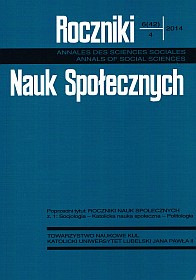The Application of New Institutionalism and the Resource Dependence Theory for Studying Changes in Universities within Europe
Abstract
This article offers the application of new institutionalism and the Resource Dependence Theory in order to study the transformation of higher education in Europe in accordance with the principles of the Bologna Process. At the start of this article, the most important assumptions of both theories are presented. In the next section, the similarities and differences between both theories are discussed. In the concluding part, some observations are made regarding the application of these theories for the study of changes in universities. Universities are understood here as organizations that respond differently to changes in the institutional environment. The combination of these theories allows us to focus on many different factors that determine the responses to change. It is shown that external factors (for instance, government policy and the economic situation) as well as internal factors (for the same university) may have an effect on the processes of change in universities.
References
Alesi B., Rosznyai Ch., Szanto T., The Implementation of Bachelor and Master Programmes in Hungary, “European Journal of Education” 3/2007, pp. 395-409.
Casciaro T., Piskorski J.M., Power imbalance and interorganizational relations: Resource Dependence Theory revisited, p. 6, online: http://web.mit. edu/sloan/osg-seminar/f03_docs/RDRevisited.pdf.
Davis F.G., Cobb A.J., Chapter 2 Resource dependence theory: Past and future, in: Stanford's Organization Theory Renaissance 1970–2000, Bingley: Emerald Group Publishing 2010, pp. 21-42.
Despotovic M., The Interpretation and Implementation of the Bologna Process in Serbia, “European Education” 3/2001, pp. 43-55.
DiMaggio P., Powell W.W., The iron cage revisited: institutional isomorphism and collective rationality in organization fields, “American Sociological Review” 2/1983, pp. 147-160.
DiMaggio P., Powell W.W., The New institutionalism in organizational analysis, Chicago: University of Chicago Press 1991.
Drees J.M., Heugens P., Synthesizing and Extending Resource Dependence Theory: A Meta-Analysis, “Journal of Management” 6/2013, pp. 1666-1698.
Fisser P., Using Information and Communication Technology, Ph.D. thesis, University of Twente, 2001.
González J.M., Montaño J.L.A., Hassall T., Bologna and Beyond: A Comparative Study Focused on UK and Spanish Accounting Education, “Higher Education in Europe” 1/2009, pp. 113-125.
Gorga A., Where Are We with the Harmonization of European Higher Education?: The Case of Central and East European Countries, “European Education” 4/2007, pp. 58-68.
Granovetter M., Economic Embeddedness, “Contemporary sociological theory” C.J. Calhoun (ed.). 2nd ed. Malden, MA: Blackwell Pub. 2007, pp. 162-170.
Granovetter M., Economic Action and Social Structure: The Problem of Embeddedness, “American Journal of Sociology” 1/1985, pp. 481-510.
Greener I., The Potential of Path Dependence in Political Studies, “Politics” 1/2005, pp. 62-72.
Hall P.A., Taylor R.C.R., Political science and the three new institutionalisms, “Political Studies” 6/1996, pp. 936-957.
Heugens P., Lander M., Testing the Strength of the Iron Cage: A Meta-Analysis of Neo-Institutional Theory, 2007, online: http://ssrn.com/abstract=962252.
Kwiek M., Emergent European Educational Policies Under Scrutiny, in: Creating the European Area of Higher Education, P. Maassen, V. Tomusk (eds.), Dordrecht: Springer Netherlands 2007, pp. 87-115.
Lučin S.P., Samaržija, The Bologna Process as a Reform Initiative in Higher Education in Croatia, “European Education” 3/2001, pp. 26-42.
March J.G., Olsen J.P., The Logic of Appropriateness, in: The Oxford Handbook of Public Policy, R.E. Goodin, M. Moran, M. Rein (eds.), Oxford: Oxford University Press 2009, pp. 689-708.
Meyer J.W., Rowan B., Institutionalized organizations. Formal structure as myth and ceremony, “American Journal of Sociology” 2/1977, pp. 340-363.
Nee V., Ingram P., Embeddedness and Beyond: Institutions, Exchange, and Social Structure, in: The new institutionalism in sociology, M.C. Brinton, V. Nee (eds.). Stanford: Stanford University Press 2001, pp. 19-44.
Nee V., The New Institutionalism in Economics and Sociology, 2003, online http: //www.economyandsociety.org/publications/wp4_nee_03.pdf.
Oliver Ch., Strategic responses to institutional processes, “The Academy of Management Review” 1/1991, pp. 145-179.
Peters B.G., Institutional Theory in Political Science, Bloomsbury: 2005, online: http://books.google.de/books?id=HXV2esV-PUkC.
Pfeffer J., Salancik G.R., The external control of organizations. A resource dependence perspective, Stanford: Stanford Business Books 2003.
Pusztai G., Szabó P., The Bologna Process as a Trojan Horse: Restructuring Higher Education in Hungary, “European Education” 2/2008, pp. 85-103.
Schmidt V.A., Taking ideas and discourse seriously: explaining change through discursive institutionalism as the fourth `new institutionalism, “European Political Science Review” 2/2010, pp. 1-25.
Scott R.W., Institutions and organizations, Thousand Oaks: Sage Publications 2001.
Scott R.W., The Adolescence of Institutional Theory, “Administrative Science Quarterly” 4/1987, pp. 493-511.
Selznick P., Institutionalism “old” and “new”, “Administrative Science Quarterly” 2/1996, pp. 270-277.
Senge K., The `New Institutionalism' in Organization Theory: Bringing Society and Culture Back, “The American Sociologist” 1/2013, pp. 76-95.
Tomusk V., The Bologna Process and the Enlightenment Project: A Bird's Eye View from the Bottom of the Slope, “European Education” 2/2008, pp. 9-28.
Van Vught F., Diversity and Differentiation in Higher Education Systems, CHET anniversary conference, Cape Town: 2007, online: http://www.universityworldnews.com/filemgmt_data/files/Frans-van-Vucht.pdf.
Veiga A., Amaral A., Survey on the implementation of the Bologna process in Portugal, “Higher Education” 1/2009, pp. 57-69.
Verhoeven J.C., Devos G., Smolders C., Cools W., Velghe J., Hogescholen. Enkele jaren na de fusie, Antwerpen/Appeldoorn: Garant-Uitgevers n.v. 2002.
Verhoeven J.C., De Wit K., Stakeholders in Universities and Colleges in Flanders, “European Journal of Education” 4/2000, pp. 421-437.
Weick K.E., Educational Organizations as Loosely Coupled Systems, “Administrative Science Quarterly” 1/1976, pp. 1-19.
Yağci Y., A Different View of the Bologna Process: the case of Turkey, “European Journal of Education” 4/2010, pp. 588-600.
Copyright (c) 2014 Roczniki Nauk Społecznych

This work is licensed under a Creative Commons Attribution-NonCommercial-NoDerivatives 4.0 International License.


